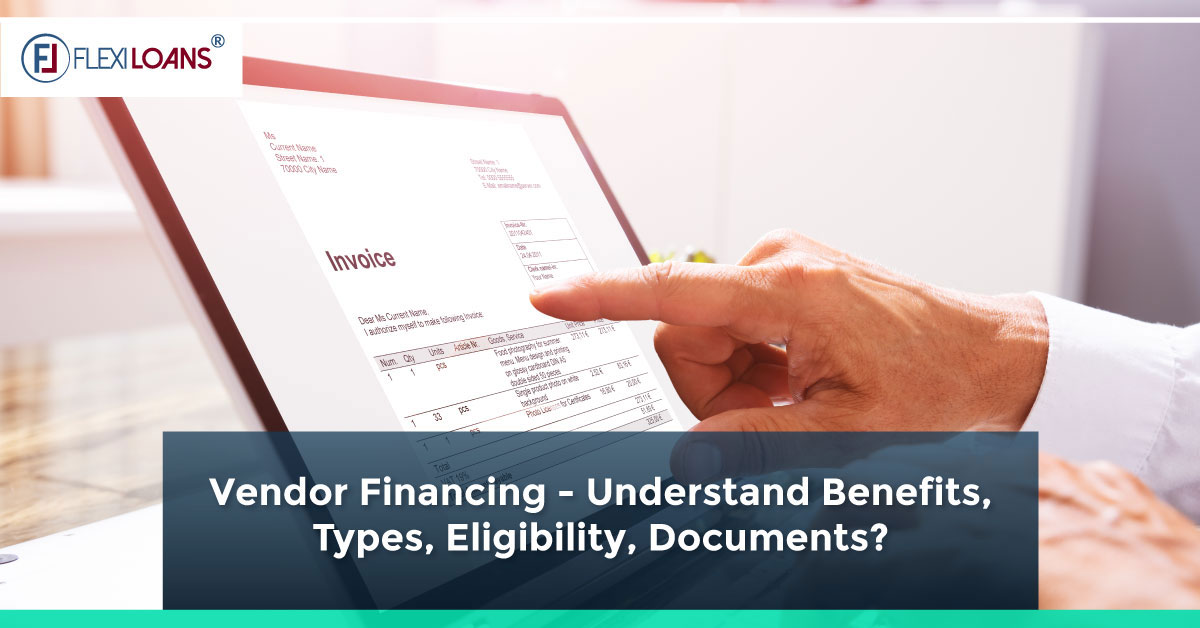Apr 25, 2021

Accounts Receivable or invoice Financing is an asset-based borrowing method. In this method, companies can raise funds against the amounts recoverable from the customers. Invoice financing companies or Invoice financing NBFC helps various enterprises or MSME’s to boost their cash flow for paying their third party stakeholders, employees and reinvesting the funds for expansion and growth of the business.
Vendor Financing Benefits
- Risk-free loans: There is no need for collateral & minimum documentation to avail of the loan.
- Hasslefree repayment tenure: The repayment tenor of the loan can go up to 12 months on invoice tenures of 30 to 120 days.
- Leverage FinTech Features: Harness the benefits of the latest technology for faster application processing and assessing creditworthiness.
- Substantial Loan Amount: Get a loan amount as high as INR 2.5 crore, or up to 90% of the invoice value.
- Pay Loan Through Profits: One of the biggest advantages of vendor financing is no need for upfront payment. You can make payments from the earnings of the product sale.
- Minimum Personal Funds Requirements: As a business owner, you just need to pay the downpayment. Beyond that, you can leverage the business profits to repay and other debt.
Types of Vendor Financing
Based on the repayment option, there are mainly two types of vendor financing. These are:
- Debt Financing: If you agree to pay the lender in the form of interest rates on the loan amount, it is termed debt financing.
- Equity Finance: If the repayment is made to the vendor in the form of the company’s share, inventory, or services, instead of cash, it is termed as equity financing. This option is more suited for start-ups or small businesses. Equity financing is also known as inventory financing.
Vendor Financing Eligibility
In order to avail of the loans under the vendor financing scheme, there are a few things that you must have. These are:
- The age of business must be more than 1 year from the date of registration.
- Should be a supplier of a reputed organization.
- Must have a valid work order, invoice, or purchase order of more than INR 1 lakh.
Documents required for Vendor Financing
- Details of the business profile and projection
- Know your customer (KYC) documents
- Financials of last 2 years
- Current account Bank Statement of last six months
Who Should Avail Vendor Financing?
Vendor financing is useful for all those business owners who have received a big order from any corporation, and need the initial funding to knee-jerk their supply chain cycle. Businesses can get financial aid after signing the deal and making the initial deposit. After getting the funding, the borrower needs to repay the sum within a predefined period.
Conclusion
However, along with these numerous benefits, there are some limitations of vendor financing as well. One of the biggest drawbacks is higher rates of interest. As a business owner, you must strike a balance between the pros and cons before opting for vendor financing.
At FlexiLoans, we leverage AI-based technology to process the applications for faster & hassle-free approval. Get in touch with us and avail of vendor financing of up to INR 2.5 crore. Apply Now.
Frequently Asked Questions Related to Vendor Financing
Q. What is the interest rate in vendor financing?
A. In the case of vendor financing, the rate of interest is dependent on a number of factors, like business requirements, loan amount, repayment period, nature of the business, the relationship between the vendor and the business owner, and so on.
Q. Can I avail of vendor financing with a bad credit score?
A. Yes, it is possible to get loans under vendor financing with a bad credit score. However, the rate of interest levied will be higher compared to other business loans.
Q. Can I use corporate bills and invoices as collateral for vendor financing?
A. Yes, you can always submit corporate bills and invoices as collateral to avail of credit guarantee under vendor financing.







